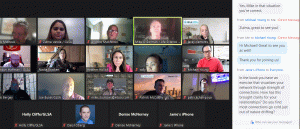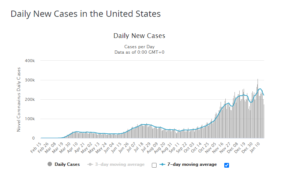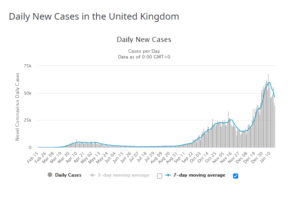One of the things I thoroughly enjoy about networking is meeting such interesting people with different perspectives. This helps us understand and appreciate those differences and helps us re-consider our approach to certain things.
On October 20, the Global Life Sciences Alliance along with FOCM Networking held its monthly pharmaceutical/biotech/clinical research/medical device/drug development industry online networking event (that’s a sentence-full). I know I wrote that in last month’s minutes too, so I promise to acronymize/shorten/bitly it next month, maybe to Pharma/Bio/CRO/Med & DrugDev or PBCMD? Is there a broader term one of you readers can suggest?
While people were arriving into the Zoom room, the first arrivers greeted each other and got their headsets, earphones, etc ready and connected. We started with the acknowledgement that October is National Breast Cancer Awareness Month. The advances in cancer therapies over the past dozen years or so is truly remarkable. With genotyping advances, new drugs are designed/created that work very well. This allows testing to be done prior to drug administration and know ahead of time that certain patients will respond well. So instead of having to enroll 300 cancer patients in a study to get enough with the defect in order to show statistical significance, the study can be done with fewer patients and to show significance and speed up the time to FDA approval.
We then moved to our featured speaker, Heather Hollick, a friend of mine for several years and the author of “Helpful, A Guide to Life, Careers and the Art of Networking”. Heather focused the discussion on best practices for using LinkedIn. It is an invaluable tool for networking. There are 8 ways that LinkedIn is beneficial.
- LinkedIn is how you present yourself to the industry. At a minimum it is your online resume.
- Enhances introductions – you know so much more about who you’re being introduced to.
- Refreshes your memory on who a person is, where you know them from and how long you’ve been connected.
- It helps you prepare for meetings – review who will be in the meeting and find items of commonality.
- Find companies that are hiring
- Provides links to other websites aiding in your research
- Keep track of who is in your network.
- Engage in groups and discussions with others that you share interest with.
I like to include how I met people, as a demonstration of the power and benefits of networking. I was connected to Heather via Tanyss Mason. I admit I’m having a difficult time remembering how Tanyss and I first became connections. Heather was in the midst of writing the book when we first met over the phone. When the book was released and Heather was in the RTP, NC area at a book premier and signing event we got to meet in person. Heather co-presented at the 2021 DIA Annual meeting (virtual) with me on a Networking workshop. We’ll collaborate again on this session for the DIA 2022 meeting being held in Chicago.
We typically go into several breakout sessions of 3-4 attendees for about 12 minutes each but this time, there was so much good discussion about LinkedIn and maintaining, nurturing and freshening one’s network that we showed our flexibility and kept rolling with the topic of interest.
Please join us next month on November 17.

ATTENDEES (bolded names were first time attendees, I think):
Heather Hollick, Rizers, LLC; Author of “Helpful, A guide to life, careers and the art of networking”
Mike Burrows, Burrows Life Science Associates, LLC
Lacey Clements, IMA Clinical Research
Nadia Bracken, Medidata
Christine Narro, Medical Device Co.
Lewis Kelly, Gunvatta
Chris Bergey, Humphries Insurance Agency
Michael O’Gorman, Life Science Marketplace
Patrick McCarthy, ValidCare
Joe Dustin, Transcelerate Biopharma
Janie St. Pierre, Accellacare
Ellen Bedenko, IQVia
Patrick Champoux, SkillPad
Andrew Mulchinski, Symbio Research
Chris Matheus, Global Life Sciences Alliance & FOCM
Denise McNerney, Global Life Sciences Alliance
Joe Buser, Global Life Sciences Alliance
Daryl Oberg, Global Life Sciences Alliance
Brandon Huffman, Global Life Sciences Alliance
Holly Cliffe, Global Life Sciences Alliance
Zulma Varela, Global Life Sciences Alliance
Sally Haller, Global Life Sciences Alliance



